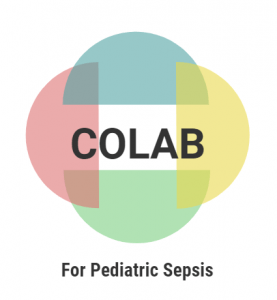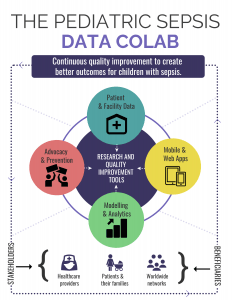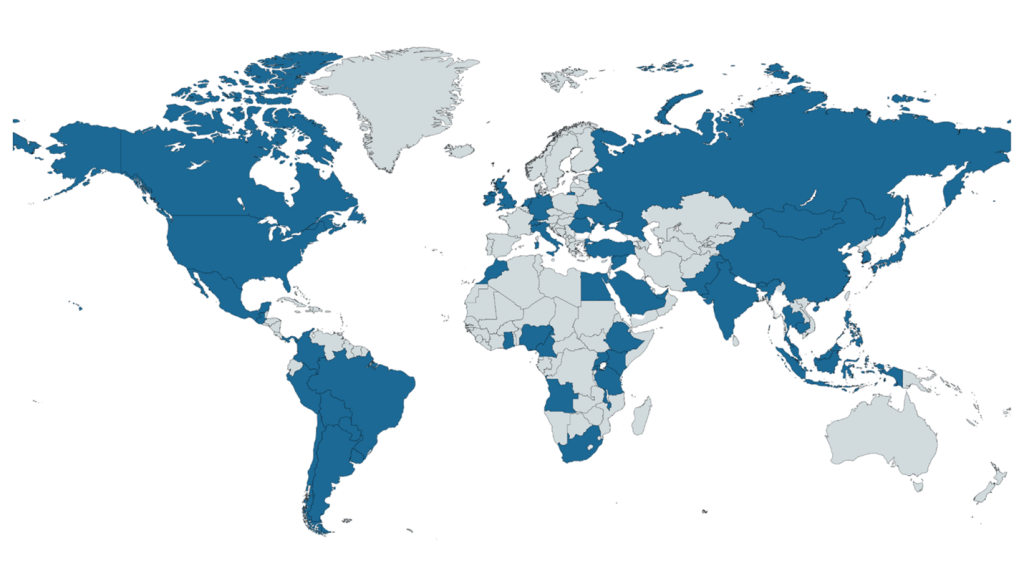
About Us
The Pediatric Sepsis Data CoLaboratory (Sepsis CoLab) is a global data-sharing network focused on reducing pediatric sepsis mortality and morbidity. Founded by the Institute for Global Health at BC Children’s Hospital and BC Women’s Hospital + Health Centre (IGH-BCCWH) and The University of British Columbia (UBC) in Vancouver, Canada, together with the World Federation of Pediatric Intensive and Critical Care Societies (WFPICCS), we aim to improve sepsis treatment and outcomes through targeted, data-driven research and quality improvement (QI) initiatives.
Every year, over 11 million people die from sepsis, primarily in low- and middle-income countries. Many of these deaths are preventable with timely, accurate data to guide individual treatment and improve hospital processes. However, in under-resourced areas, clinical data collection is often paper-based. This poses challenges to using data effectively to inform clinical decision making and QI approaches. The WHO’s first global report on sepsis, released in September 2020, highlighted how gaps in data have hindered global control efforts and reinforced the urgent need for better data practices.
The Sepsis CoLab works to address these challenges by promoting international collaboration to develop and validate tools, share knowledge, encourage innovation, and share clinical data to advance improvements in sepsis care. Through these efforts, the Sepsis CoLab is helping to create a global framework for more effective, data-driven interventions in the fight against pediatric sepsis.
Visit the Sepsis CoLab FAQ page to learn more. Join as a member here
Our Focus Areas
- Patient and Facility Data – Developing tools to enhance the collection of relevant, accurate data for research and quality improvement.
- Mobile and Web Applications – Creating low-cost digital technologies to inform, diagnose, advise, and plan for improved outcomes.
- Modeling and Analytics – Sharing and utilizing data to determine the best courses of action.
- Advocacy and Prevention – Promoting improved guidelines and practices at facility, national, and global levels for better early recognition of sepsis.
Data Curation
The Sepsis CoLab stores and shares curated data using The University of British Columbia’s Dataverse on Borealis. Borealis is a secure virtual repository for research and QI data with a rigorous data governance structure. To gain access to the Sepsis CoLab’s Dataverse, members must sign a Memorandum of Understanding. While most resources are openly available to the CoLab community, access to sensitive de-identified clinical data is made on a case-by-case basis following approval from the data governance committee. Borealis ensures that data contributors retain ownership and control of their data, while enabling secure, compliant sharing within the CoLab.
For more information about data sharing, visit our FAQ page.
Open Data
Open data is data that anyone can access, use, and share, allowing scarce resources to be leveraged for broader access and more discoveries without costly investments. This approach helps address inequalities and improve health outcomes globally. The FAIR Data Principles support discovery through good data management, ensuring data is Findable, Accessible, Interoperable, and Reusable.
In health research and practice, open data informs policymaking and advances our knowledge and ability to treat diseases. By sharing and reusing data, study results can be used by many, minimizing the need to collect new data from patients and reducing associated risks. Open data has multiple benefits as it ensures results are transparent and verifiable, enables low-cost secondary analysis, fosters collaboration within the research community, and enhances public confidence in science.
While there are risks opening clinical data, such as breaching participant privacy or causing unintended harm like stigmatization to individuals or groups, these concerns can be mitigated through moderated data access, data de-identification, or the use of synthetic data. Check out our open data training resources to learn more.
Sepsis CoLab Network
The continuously expanding Sepsis CoLab network includes over 50 countries and is guided by a 13-member Steering Committee of regional and technical experts. Our working groups focus on key areas: the Predictors Working Group standardizes data collection for pediatric sepsis studies, the Environmental Scan Working Group develops tools to assess facility readiness for sepsis care in low-resource settings, and the Long-Term Outcomes of Sepsis Working Group aims to improve post-sepsis outcomes. Resources from these efforts are available on the Sepsis CoLab’s Dataverse.
Pediatric Sepsis Data Challenge
On November 4, 2024, the 2024 Pediatric Sepsis Data Challenge officially launched. Hosted by the Sepsis CoLab, the Institute for Global Health at BC Children’s Hospital and BC Women’s Hospital + Health Centre, WFPICCS, and Duke University, the challenge attracted 102 teams from 43 countries.
Participants worked with a synthetically generated dataset modeled on real clinical data to develop predictive models for in-hospital mortality in pediatric patients.
The challenge aimed to address the global burden of sepsis in children while fostering collaboration and advancing the use of machine learning in clinical risk prediction. It provided a unique opportunity for healthcare professionals, data scientists, and students worldwide to build and refine their skills in developing predictive models.
The Final Results
The 2024 Pediatric Sepsis Data Challenge is now complete! We were thrilled to have 16 finalist teams from 13 countries participate in the final round. These teams brought forward innovative, high-performing algorithms to predict in-hospital pediatric mortality using a synthetic clinical dataset derived from real patient data.
Top 3 Teams
– First Place: Team AIMS – Cameroon, Uganda, Morocco, Canada
– Second Place: Team Epiphany – USA
– Third Place: UCL Paediatrics – UK
Need Data? Got Data? Join Us!
Members benefit from networking opportunities, mentorship, and access to the CoLab’s Dataverse repository. This enables them to utilize guidelines, tools, algorithms, and various other resources developed and shared by the CoLab community as well as securely store, share, and access de-identified patient data through established data sharing agreements. Become a member here.
Explore our FAQ page to learn more about the Sepsis CoLab, or reach out to us at sepsiscolab@bcchr.ca or on LinkedIn.



